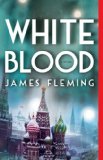Summary | Excerpt | Reviews | Beyond the Book | Readalikes | Genres & Themes | Author Bio

One
My father, George Doig, died of the plague. That was
in 1903, when I was fourteen and he in the flower of his
age. For many years he’d been the manager of their Moscow
office for Hodge & Co., the big cotton-brokers. During this
period he made himself attractive to Irina Rykov, and married
her. She was the granddaughter of the Rykov who raised the
loan that kept the Tsar’s army going in 1812. In this way I was
a direct descendant of the man who saved Russia from Napoleon.
Until recently, these were the principal facts in my life over
which I’ve had no control. I must add a physical description of
myself.
I can’t remember having been small. Nanny Agafya sometimes
sought to dominate me by saying that Mother had spat
me out. “Five heaves and there you were, all slimy and bawling,
no bigger than a gherkin.” This has never been the sense I’ve
had of my person. Some initial helplessness, suckling, infancy,
these I concede, remarking that they belong to the period of
the womb, which had nothing to do with me. It is from the age
of my first complete memory, four years and two months, that
I date myself.
It was the day that we moved into the fifth, the top, floor of an
apartment building off the fashionable end of the Tverskaya.
Moscow was entering its most capitalist phase. Accommodation
was difficult to find, everything being half finished. It was a
measure of Potter Hodge’s satisfaction with my father that the
firm was prepared to pay the premium on the Tverskaya.
To keep me quiet while the men were setting out our furniture,
I was bribed with the gift of a troop of the 1st Sumsky Hussar Regiment in a
polished chestnut box: black horses, the
soldiers in brick-red breeches and blue dolmans with yellow
braid. The brilliance of their colours and the evocation of
Russia’s martial glories made me shudder with excitement.
Things got out of control. It was not my fault that a subaltern
spoke dishonouringly of his senior officer, or that satisfaction
was demanded. But it was I who whispered encouragement to
the captain, I who set the two chargers and their riders at each
other across the new tan linoleum, and I who plotted the melee.
Sabres rang. The horses reared as if boxing each other. They
snickered with fear. Voluble advice came from the seconds, both
of whom I represented. At the exact moment that the subaltern’s
shako’d head flew off, my father, made testy by a week
of packing and argument, was passing the door.
“Why, you little devil, I’ll have you know that I scoured the
city for those. The best, none better in all of Moscow, and see
what you’ve done to them. Already!”
“What do you mean, of course they could be better,” I countered.
What were they for if not fighting? I threw the severed
head at him. “Look at that.”
For this I was walloped by Nanny Agafya with the back of
a long-handled wooden clothes brush. It was my first meeting
with physical force, mankind upon man, object on flesh. The
scene has remained in my mind as an example to be followed.
Pummel! Strap! Flog! It’s the only way. The carrot is the solution
of the dilettante. It’s invariably construed as a sign of weakness.
To offer it simply hedges the issue, defers everything.
From that day on I have been conscious only of being the
Charlie Doig that I now am. Six foot two, strong in the shoulder
and broad in the chest. Wide Russian face, straight dark hair,
stubble. Eyes of blue: not the loony blue of the German philosopher
but steadier, more brutal, with flecks of iron and schist.
Powerful high-boned wrists. Mangling stride. A rugged obnoxious
nose. And proper Russian balls that swing like the planets.
Nothing of the gherkin down there.
Excerpted from White Blood by James Fleming Copyright © 2007 by James Fleming. Excerpted by permission of Atria Press, a division of Simon and Schuster, Inc. All rights reserved. No part of this excerpt may be reproduced or reprinted without permission in writing from the publisher.




No pleasure is worth giving up for the sake of two more years in a geriatric home.
Click Here to find out who said this, as well as discovering other famous literary quotes!
Your guide toexceptional books
BookBrowse seeks out and recommends the best in contemporary fiction and nonfiction—books that not only engage and entertain but also deepen our understanding of ourselves and the world around us.